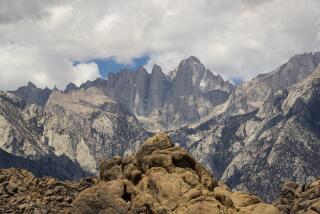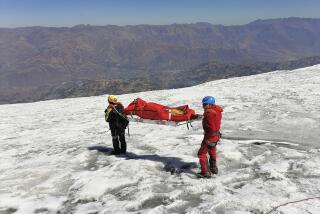Look Back at Life on the Mountain : Chronicling Ups and Downs of 10 Weeks on Mt. Everest
- Share via
In 1924, British mountaineers George Mallory and Andrew Irvine disappeared after being spotted just 900 feet below the summit of Mount Everest. For more than 60 years, climbers have argued about whether the two men reached the top before perishing. This fall an expedition went to Everest to search for the bodies of Mallory and Irvine, and for cameras they carried that might contain film proving that they did indeed conquer the world’s highest mountain 29 years before the celebrated ascent of Sir Edmund Hillary and Tenzing Norgay. In periodic reports, expedition members told of the unceasing storms, bitter cold and avalanche danger that impeded their progress. A few weeks ago, after the avalanche death of an expedition Sherpa, the project was called off. In the final installment of their series, key expedition members recount the successes and disappointments of their 10 weeks on the mountain.
For me the most interesting aspect of our expedition occurred not on the slopes of Everest, but during our return through China, where we obtained new information bolstering the controversial claim that a Chinese climber in 1975 had spotted the body of “an English dead” at the 27,000-foot elevation of the mountain’s North Slope.
Our expedition’s primary goal, thwarted by the early onset of winter, had been to search the snow terraces for the bodies of Mallory and Irvine. Unlike some skeptical mountaineers, we tended to believe reports that Chinese climber Wang Hung Bao had found a British body in that area 11 years ago. After all, I had predicted in 1971 that at least one of the bodies could most likely be found on that snow terrace.
Wang reported to his expedition’s leader the discovery of “an English dead” dressed in old-fashioned clothing that “danced in the wind” when touched. The corpse, he said, had a hole in one cheek. The day after filing the report, Wang was killed in an avalanche.
Wang’s statement remained a secret until 1979, when a member of his expedition relayed the story to the leader of a Japanese climbing team, Ryoten Hasagawa. It circulated quickly, and was quickly denounced as a delusion by the Chinese Mountaineering Society and by older British climbers. We were determined to learn more about the controversy during our trip through China on our way back to the United States.
The Chinese liaison officer assigned to our expedition, Song Zhiyi, agreed to introduce us to the group climbing leader of Wang’s assault team, Chen Tian Lian, now an official of the Tibetan Mountaineering Assn. in Lhasa. Chen had led a four-man team, including Wang, on an unsuccessful summit attempt. Certainly if Wang had discovered a body, it could only have been while climbing with Chen and their two other companions. Song agreed to introduce us to Chen upon our return from the mountain through Lhasa.
Persistence Pays Off
The five-hour interview of Chen at the Lhasa Hotel started on a depressing note. He began by stating that he had been with Wang the entire four days the group was in the 27,000-foot area or higher, and that he was aware of no body discovered by Wang during that period. But persistence pays off. It was only in the final half-hour of our discussion that Chen recalled receiving an emergency radio call from Base Camp ordering him up to the next camp--a hasty bivouac, actually--at 28,000 feet, to search for a missing Chinese climber. “Did you take Mr. Wang with you on this climb?” I asked. “No,” he replied, “I went with one of the Tibetan porters. Wang and his partner Zhang Jun Yan remained in C-6 (the camp at 27,300 feet) for the day.”
“So it was possible that if Wang did find a body, he could have done so on that day, May 5, without you knowing it?” Chen gazed at me intently as he thought about that question.
“Yes,” he answered finally, “it is possible.” Our next assignment was clear. Find Zhang, living in Peking.
Song arranged a meeting with Zhang on the evening of our departure to the U.S. During a short discussion over supper at the Bei-Wei Hotel in Peking, Zhang confirmed he and Wang had been left behind when Chen and his Tibetan companion embarked on their rescue mission. Zhang said he stayed in his sleeping bag that morning. But Wang got up and wandered around the snow terrace by himself. Then came the big question: “Did Wang ever mention finding the body of an English mountaineer?”
“Yes, he did,” Zhang answered easily. “He mentioned it to me and to several of our climbing companions on the way down.”
Zhang’s statement marked the first confirmation by a Chinese member of that 1975 expedition that he had personally heard Wang’s claim, and it directly refutes the contentions of skeptics that Hasagawa fabricated or distorted the story.
More to Read
Sign up for The Wild
We’ll help you find the best places to hike, bike and run, as well as the perfect silent spots for meditation and yoga.
You may occasionally receive promotional content from the Los Angeles Times.






